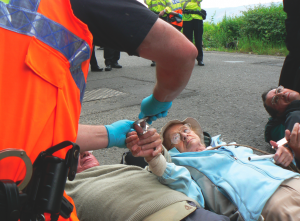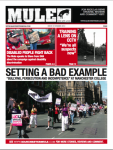Interview – Sarah Irving on Manchester’s Radical History
Article published: Tuesday, September 14th 2010
For centuries Manchester has been home to a thriving culture of campaigning, radicalism, and direct action. Andy Lockhart spoke to Sarah Irving, co-founder of the Manchester Radical History Collective, a website run by politically active locals dedicated to unearthing a rarely seen side to the city.
 Andy Lockhart: How did the Manchester’s Radical History project come about?
Andy Lockhart: How did the Manchester’s Radical History project come about?
Sarah Irving: We’d had a few conversations about how little awareness there is, among generations of activists, of what other activists have done before. There’s no sense of being part of a wider movement. Those of us who’d been doing direct action for a number of years found people starting at the same points we’d started at long before, who weren’t benefiting from our mistakes – or successes.
It has psychological repercussions. If you start out as an activist in your teens or early twenties it’s all very exciting and energetic, but many of my contemporaries dropped out [of being activists], partly because people get more conservative, but also because movements are bad at looking after themselves and people within them. When you take a longer view, you realise the people still doing interesting and useful work in their sixties, or eighties, are the ones who’ve taken the necessary time out to study, have kids or just get a bit of perspective, even if they’ve had periods of very intense activity.
At one of the Faslane [nuclear submarine base] 365 actions, one of the people arrested for locking themselves onto the base entrance was Betty Tebbs, then just short of her 90th birthday. Activism for her started when she was 14, when she joined the trade union at her factory because she was being paid less as a girl. She did anti-nuclear work in the 1940s, cycling round north Manchester in 1948 painting “Ban the Bomb” on bridges. She’s had this amazing life, involved in the feminist, trade union and peace movements, but also raised her kids, had a very happy marriage and studied in her fifties or sixties. It was really inspiring to see how she’d managed all this and still has the most incredible fire and passion.
Another purpose [of MRH] is to develop new writers; giving them a platform and pay. That’s one reason I felt strongly about fundraising from the start. If you’re aspiring to be a writer then being paid can be a very important point in feeling that it’s something you do seriously, and recognising that people can’t afford to do things for free all the time.
AL: What have you learnt from the project?
SI: I knew that Manchester had an amazing radical history: Peterloo, Suffragettes, Chartists and so on associated with the city, but it’s the details and individuals that are fascinating. Little incidents highlight so much.
We had a couple of submissions about Friedrich Engels and people who knew him. With the Spinningfields development, it’s hard to envisage that area just off Deansgate was, 150 years ago, this stinking warren of slum housing. There – in the mid-19th Century I think – a kind of community-appointed policeman would go around dealing with fights in the street and things like that. This particular guy had been doing it for years until one day everyone discovered it was a woman – those little incidents are great to learn about. People can understandably be put off by a 400-page history book. We do a more journalistic approach, focusing on people and telling stories through their lives and experiences, rather than through grand historical narratives.
One great thing has been people coming to the website and commenting. We also get a lot of traffic from people researching their own families. Lots of people researching local, personal history, are poor at communicating what they find. Hopefully MRH can help bridge that gap. For instance, in the 1930s a couple of Irish Republican men were sprung from a jail over on Hyde Road. In the official historical records, one disappears. There were rumours he’d been spirited off to America or Canada, but not formally known. We actually had one of his descendants saying, “Oh, well, family history says he ended up about three miles away.” It’s great having that dialogue and feeding in information that historians relying on documentary evidence don’t often have.
As well as people doing family histories, there are loads of little local history groups who aren’t very web-savvy. If they’re publishing at all it’s on only locally available pamphlets and hard for outsiders to access. MRH provides an opportunity for that stuff to get out to a wider audience.
AL: What is the future of MRH?
SI: At the moment I run it and various people write and help out with pieces here and there. I’d like to build up the editorial collective and widen the writers’ pool.
In terms of other projects, [I’d like to do] things like running workshops with the Working Class Movement Library to introduce people to the resources out there. The WCML has so much stashed away that people have never gone through, not to mention other sources in the universities and places like that.
I’d also like to do research with sixth formers in places like Moss Side and Ancoats, where there have been waves of immigration and so on. Getting kids to interview grandparents: people who’ve been involved in wars; community campaigns or strikes for instance. Every time one of them dies, we practically lose a whole library of experience and knowledge, information and material.
About 18 months ago, I was in the pub talking to my friend Leo about discovering that there used to be coal mines in Levenshulme and Gorton – Gorton Colliery – and coal seams under Stockport Road. Apparently, there are little bits left over from the workings in alleys there, along the railway. Later, Leo starts chatting to a guy outside and comes back saying, “That guy used to work in the coal mines!” He’d shown her the workplace scars he had on his arms which were blue because of the coal dust.
If he’s old enough to have worked in mines which stopped being productive around World War Two, he’s getting on a bit. We need to find ways to get people out there and realising that some of the most interesting people they can talk to might be their own granny or grandpa. One of my great regrets is never sitting my grandpa down with a tape recorder and getting him to tell me about his life – he was involved with left-wing working class movements in the 1920s and ’30s and I only know little bits of it.
It’s important in terms of valuing knowledge and experiences like that. It’s not glamorous or famous but it’s important information about things that have shaped our society, our economics and our politics – which is not just about what politicians did.
Visit the site at: radicalmanchester.wordpress.com
This article features in the print edition of The Mule – Issue 10, out now for FREE around Greater Manchester
More: Features, Interviews
Comments
-
[…] History Journal and has written numerous articles about Manchester’s history, including the Manchester’s Radical History website. He has written two books: Never Counted Out!, a biography of Manchester black boxer Len Johnson […]
Pingback by Historian launches radical walking tours of Manchester — MULE on May 4, 2011 at 6:46 pm
The comments are closed.




